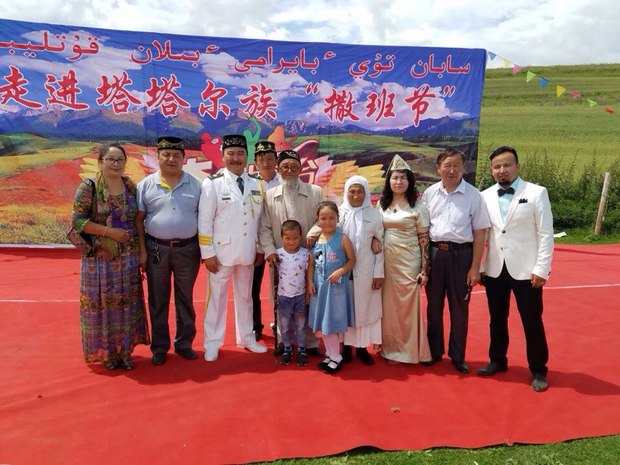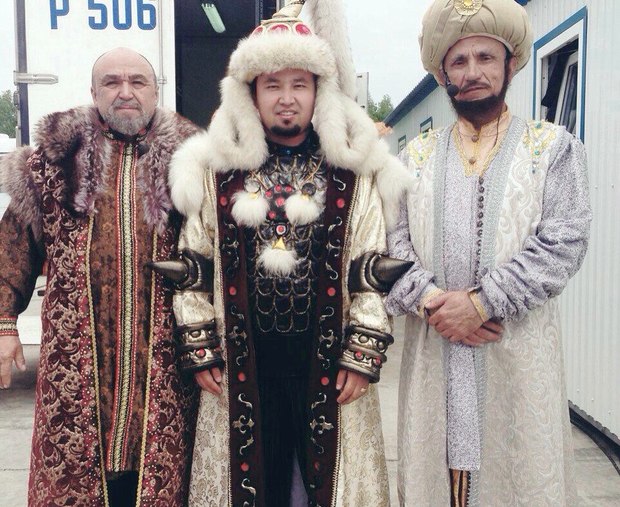Bazarbay Bikchantaev: ''The Tatar language is not taught at schools and universities. But families try to conserve at least traditions and songs''
Interview of Chinese Tatar guy who moved to Kazan to sing about the Golden Horde
Tatar singer from China Bazarbay Bikchantaev released a new song about Tatar history. However, financial difficulties impeded from shooting a great video. At least 1,5 million rubles will have to be spent to shoot videos with parts in Bolgar and China. In his interview to Realnoe Vremya, Bikchantaev told why Chinese respect Tatars and how he learnt to speak Tatar.
''The Tatar language is not taught at schools and universities. But families try to conserve at least traditions and songs''
To start with, could you tell us where you are from? Where did you live before you moved to Kazan?
I was born and grew up in China. Chinese district Xinjiang has the only Tatar village called Chishma, I come from there. I lived and worked in Ürümqi from 2001. I moved to Kazan in 2012 and I am living here now.
Were your parents born in China as well? How did they appear there?
They are also from China. Our ancestors moved from Tatarstan in 1831 or so. Unfortunately, I can't say for sure where exactly they came from.
Do you have any connection with Kazakhstan?
They lived in Kazakhstan and Mongolia after their departure. All in all, they moved to Chinese city Altai.
Generally speaking, is the Tatar diaspora in China big?
According to written sources, about 4,000 Tatars live in China. The Tatar diaspora is located in four cities, including Ürümqi and Yining. And Chishma is a village where Tatars live.
Are there famous people among Chinese Tatars?
Professor of the Kazan University Mirkasym Usmanov is one of the most celebrated Tatars from China. He moved to Kazan in the 1950s. How his family is living here. Ilyar Gabitov is another famous person. He is living in Yining. Burhan Shakhidi was born in Aksu village in Buinsk District. He was Chinese ruler Mao Zedong's adviser and right-hand man.
Why did you decide to move to Kazan?
I came to participate in Tatar Mony contest in 2012. Then I decided to pass exams to go to conservatoire. It turned out Kazan attracts. I did not want to return. I became a laureate of Tatar Mony, passed exams and entered the conservatory. So I remained here.
Did not you want to bring your family here? Don't your parents want to return?
My wife is living here now. My parents want to come to Kazan, of course. But processing of visa and other documents is quite a complicated issue.

I was born and grew up in China. Chinese district Xinjiang has the only Tatar village called Chishma, I come from there
How did you manage to learn to speak Tatar fluently living in China? How did you manage to conserve the language?
As there are few Tatars in China, the Tatar language is not taught at schools and universities. But families try to conserve at least traditions and songs. At first I did not speak Tatar fluently. I learnt a lot in Kazan. But I sang in Tatar.
''I wanted to issue the song about our history''
You have posted a song Know Your Roots, Tatar in social networks recently. Could you tell about it? Who is the author? Why did you decide to perform it?
I was dreaming of recording Know Your Roots, Tatar for a long time. I think it is impossible to exist without knowing history whatever nationality we can be speaking about. I was interested in history in the past. When I lived in China, our grandparents told what their ancestors had told them.
Having arrived in Kazan, I shared my idea with deputy chairman of the Executive Committee of the World Congress of the Tatars Mars Tukaev. I said I wanted to release a song about our history. I asked him to advise me a person who would know our history and could write the lyrics. At that moment I did not have many acquaintances in Kazan. Mars Tukaev's wife also comes from Chinese Tatars. This is why I knew them a long time ago. He offered me to work with poet Shamsiya Zigangirova and gave me her phone number. I called her, and she agreed to meet. I told her my idea and explained that we needed to call the names of our ancestors to show the history. Having thought it over, Shamsiya apa agreed. The text was ready in a week.
My friend Bagdat was the composer. He was born in Chinese Altai. He is even called Bagdat Altaev. Our history had throat singing. This is why I asked him to include folk motifs too. This is how this song appeared.
Speaking about throat singing, how did you know about this technique? Why did you decide to use it?
I can't say whether Kazan Tatars conserved it. If we have a look at our history, throat singing was used. Probably it was used before Islam was adopted by our nation. Shamans conserved it. As throat singing was interesting for me, I though it was present in our history, so I decided to use it.
''In China, many people respect Tatars''
Together with the song in social networks, you published a photo with actors of Galiaskar Kamal Theatre. You all had historical costumes. Did you take it during the shooting of the video for Know Your Roots, Tatar?
I told one music video director the idea of the shooting for this song. It turned out about 500-600,000 rubles are needed to do it. This is why I had to postpone the idea. Probably there will be some person who would like to help us. We were going to start the shooting in Bolgar and at the same time show a link with China. Having worked a bit, we stopped due to financial problems. As for the photo, we performed at a concert in Bolgar. The photo was taken at that moment.

We performed at a concert in Bolgar. The photo was taken at that moment
Are the Chinese and Tatar cultures similar?
From a linguistic perspective, no. Only our songs are similar because the pentatonic scale is used. This is why when I listen to some Tatar songs, I think I hear Chinese music or vice versa when I hear sounds of Chinese music, it seems to me the motifs are Tatar. There is some similarity in music, not in the language and culture.
What is the attitude towards Tatars in China?
In China, many people respect Tatars. Even if not many Tatars live in China, they are all educated people and scientists. In Xinjiang, Tatars are supposed to be one of the first people who distributed education. For this reason, they are treated with respect.